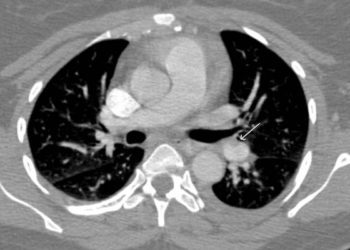Hydroxurea not associated with clinically impaired vaccine response
1. Data analysis from the BABY HUG trial comparing immunologic function in children with sickle cell disease treated with hydroxurea versus placebo revealed that while absolute lymphocyte counts were lower in hydroxyurea-treated children, these numbers were still within the range of normal for healthy children.
2. By the end of the study period, hydroxurea-treated children achieved similar and protective levels of antibody response to the pneumococcal vaccine and measles, mumps and rubella (MMR) vaccine compared to placebo.
Evidence Rating Level: 1 (Excellent)
Study Rundown: Sickle cell patients have an increased susceptibility to infection by encapsulated organisms. Hydroxyurea causes cell cycle arrest and is a commonly used treatment for young children with sickle cell disease; however, little is known about its effects on developing immune function. In the BABY HUG trial, children and young infants were randomized to receive hydroxyurea or placebo. While hydroxyurea-treated children had significantly lower absolute lymphocyte, CD4 T-cell, and memory T-cell counts compared to placebo-treated children, their numbers were still within the range of normal for healthy children. Antibody responses to the pneumococcal vaccine were similar in both groups. The hydroxurea-treated group had a slower initial antibody response to measles, though both groups achieved comparable and protective levels of antibodies to measles, mumps by the end of the two-year study period. Though this study is limited by a small sample size and a fixed dose of hydroxurea (20mg/kg) that may be below what is used in practice, pediatricians may be reassured hydroxyurea does not appear to have clinically significant consequences on the developing immune system.
Click to read the study published today in Pediatrics
Relevant Reading: Impact of hydroxyurea on clinical events in the BABY HUG trial
In-Depth [randomized control trial]: A total of 193 children (mean age at study completion = 37.9 months) with sickle cell disease aged 7-18 months were initially enrolled into the multicenter, double-blind BABY HUG trial in order to investigate the safety of hydroxyurea treatment and randomized to receive hydroxyurea or placebo from 2003 to 2009. There was no significant difference between the treatment groups in absolute lymphocyte count or the T-lymphocyte subsets prior to intervention. At the end of the 2-year study period, the hydroxurea group had significantly lower absolute lymphocytes (4386 [hydroxyurea] vs. 5219 [placebo]; P = 0.012), absolute CD4 count (1365 [hydroxyurea] vs. 1584 [placebo]; P = 0.031) and memory CD4 T-cells (324[hydroxurea] vs. 409 [placebo]; P < 0.001) compared to the placebo group. Antibodies to pneumococcal polysaccharide were measured at study onset, at age 24 months, at age 26 months and at the end of the study (24 months after enrollment); there was no significant difference in the proportion of hydroxyurea-treated or placebo-treated children who achieved protective IgG levels to pneumococcal serotype 51 (found exclusively in the PPV-23 pneumococcal vaccine) at any time point. There was a significantly lower proportion of the hydroxyurea group that achieved protective IgG levels to measles measured 2-10 weeks after vaccination (P = 0.032); however, this difference no longer existed at conclusion of the study period.
More from this author: Peer-mentored therapy reduces distress in mothers of children with disabilities; Increased risk of hookah use in urban and high socioeconomic adolescents; AAP recommends STI screening for adolescents and young adults; Adverse childhood experiences identified by low-income, urban young adults; Varicella vaccination not associated with increased adolescent disease burden
Image: PD
©2012-2014 2minutemedicine.com. All rights reserved. No works may be reproduced without expressed written consent from 2minutemedicine.com. Disclaimer: We present factual information directly from peer reviewed medical journals. No post should be construed as medical advice and is not intended as such by the authors, editors, staff or by 2minutemedicine.com. PLEASE SEE A HEALTHCARE PROVIDER IN YOUR AREA IF YOU SEEK MEDICAL ADVICE OF ANY SORT.





![Novel biodegradable sirolimus-eluting stents non-inferior to durable everolimus-eluting stents [BIOSCIENCE trial]](https://www.2minutemedicine.com/wp-content/uploads/2014/09/Taxus_stent_FDA-e1607803635904-75x75.jpg)
